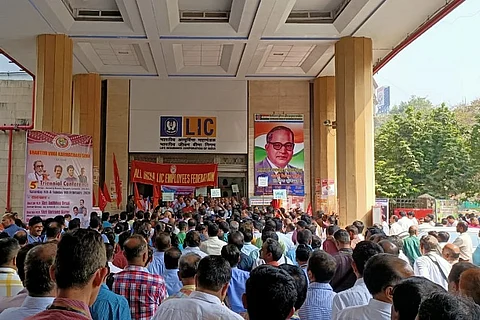

Employee unions of Life Insurance Corporation (LIC) are staging agitations across the country against the government’s decision to divest part of its stake in the country’s largest life insurer.
On February 1, Finance Minister Nirmala Sitharaman announced during the Union Budget that the government will be going for a partial stake sale in LIC through an initial public offer in the next financial year.
While this decision was met with mixed reactions, three employee unions have decided to stage an agitation against the partial divestment.
On Monday, several employees gathered at LIC offices across India during their lunch break to protest the move across all 2048 branches, 114 divisional offices and eight zonal offices.
The joint forum of LIC's three major trade unions- Federation of LIC Class-I Officers' Associations, the National Federation of Insurance Field Workers of India and the All India Insurance Employees Association (AIIEA) are leading the agitations. In fact, prior to the budget announcement itself, the AIIEA had threatened to go on a flash strike in case the Centre announces the listing of LIC.
These three organisations reportedly represent nearly 90% of LIC’s total workforce.
According to S Rajkumar, General Secretary, Federation of LIC Class-I Officers' Associations, there is no reason for the government to want to divest its stake. LIC is currently one of the only profitable government organisation, which is known for its high standards in terms of claim settlement and policy servicing. It was founded in 1956 and with government's investment of Rs 5 crore then, LIC has given it a dividend of Rs 2,600 crore as of last year.
In such a scenario, employee unions say that there is no need to sell simply because the government needs money.
“This is people’s money that we have collected. Owner of the money in LIC is not the government, it’s policyholders. Even when we part with profit, we give only 5% to the government, rest we give to policyholders as a bonus. So how can the government take away the right of policyholders?” Rajkumar questions.
Rajkumar believes that the listing of LIC will adversely affect policyholders. Once LIC is listed, there will be more ‘owners’ of the company in the form of shareholders, which will mean that a portion of profits will have to go to them as well. This Rajkumar says, will reduce the bonuses that policyholders currently receive.
He also says that LIC has huge assets, nearly 10 times more than the book value. “If you put a conservative value and put a price on the share, this hidden wealth will be transferred to corporations and rich individuals. This means the money we collected from individuals for 60 years will be looted by the rich,” he claims.
However, Rajkumar says that there is no threat to employees from the company going in for an IPO.
“In fact, the government may give employees stock options, which might actually benefit us. But we are concerned about the impact on the country and policyholders,” he adds.
A protest is being held currently across all 2048 branches, 114 divisional offices and eight zonal offices of the LIC. At the Mumbai central office, B Humraskar, President, Federation of LIC Class 1 Officers' Association addressed a large gathering of LIC employees of the Joint front.
On Tuesday, employee unions will stage a one-hour protest again across all officers before their lunch break. Rajkumar says that post this, unions will meet again and decide the course of further agitations, where they will invite policyholders to join the agitations as well.